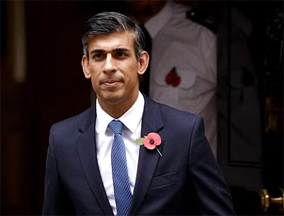LONDON (TIP): Britain’s Prime Minister Rishi Sunak on September 21 insisted he was “not slowing down efforts” to tackle climate change, a day after softening green policies aimed at achieving net zero carbon emissions by mid-century. Sunak told a news conference on Wednesday that the UK was adopting a more “pragmatic” approach to meeting the net zero target.
The new strategy will include the pushing back of a ban on the sale of new petrol and diesel cars from 2030 to 2035. The prime minister also announced an easing of energy efficiency targets for rental properties and backtracked on plans to make homeowners replace gas boilers with heat pumps.
The rethink in green policy was met with a backlash from opposition lawmakers, environmental campaigners, the car industry and some MPs of Sunak’s Conservative Party.
But Sunak on Wednesday defended the changes as chief executive of the independent Climate Change Committee, Chris Stark, called his policy shift “wishful thinking” and said the UK now didn’t have the policy package to hit its targets.
“We are absolutely not slowing down efforts to combat climate change. I am very proud of our country’s leadership,” Sunak said in an interview with the BBC.
The premier said he agreed that “you can’t just wish or will your way to net zero”, but added that “people have asserted these targets without having an honest conversation with the country about what’s required to deliver them”.
He said the government had an “ongoing responsibility” to put policies and proposals in place that would allow the UK to meet its international and domestic obligations.
The government remained “committed” to those targets, he said, adding that he had “absolute confidence and belief that we will hit them”.
The policy shift comes as British voters are facing a cost-of-living crisis that has seen food and housing costs spiral with concerns multiplying over the potential financial cost of the government’s net zero pledge.
With a general election expected next year, the Conservatives are trailing in the polls behind the main opposition Labour Party. (AFP)
UK Prime Minister Rishi Sunak defends climate policy shift
